Related Research Articles
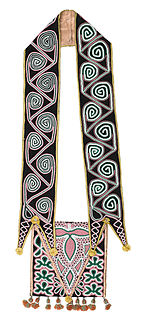
The Muscogee, also known as the Muskogee, Muscogee Creek, Creek, Mvskokvlke, or the Muscogee Creek Confederacy in the Muscogee language, are a group of related indigenous peoples of the Southeastern Woodlands. Their original homelands are in what now comprises southern Tennessee, all of Alabama, western Georgia and part of northern Florida.

Escambia County is a county located in the south central portion of the U.S. state of Alabama. As of the 2010 census, the population was 38,319. Its county seat is Brewton.

Atmore is a city in Escambia County, Alabama, United States. It incorporated in 1907. As of the 2010 census it had a population of 10,194, with an estimated population of 9,107 in 2019. Atmore is in the planning stages to increase its economic base with additions in its new Rivercane development along the I-65 corridor.
The Seminole are a Native American people originally from Florida. Today, they live in Oklahoma and Florida, and comprise three federally recognized tribes: the Seminole Nation of Oklahoma, the Seminole Tribe of Florida, and Miccosukee Tribe of Indians of Florida, as well as independent groups. The Seminole people emerged in a process of ethnogenesis from various Native American groups who settled in Florida in the 18th century, most significantly northern Muscogee Creeks from what is now Georgia and Alabama. The word "Seminole" is derived from the Muscogee word simanó-li, which may itself be derived from the Spanish word cimarrón, meaning "runaway" or "wild one".

The Qualla Boundary or The Qualla is territory held as a land trust by the United States government for the federally recognized Eastern Band of Cherokee Indians, who reside in western North Carolina. The area is part of the Cherokee's historic territory. The tribe purchased the land in the 1870s, and it was subsequently placed under federal protective trust; it is not a reservation created by the government. Individuals can buy, own, and sell the land, provided they are enrolled members of the Tribe of the Eastern Band of the Cherokee Indians.

The Fort Hall Reservation is a Native American reservation of the federally recognized Shoshone-Bannock Tribes in the U.S. state of Idaho. This is one of five federally recognized tribes in the state. The reservation is located in southeastern Idaho on the Snake River Plain about 20 miles (32 km) north and west of Pocatello. It comprises 814.874 sq mi (2,110.51 km2) of land area in four counties: Bingham, Power, Bannock, and Caribou. To the east is the 60-mile-long (97 km) Portneuf Range; both Mount Putnam and South Putnam Mountain are located on the Fort Hall Reservation.

The Alabama or Alibamu are a Southeastern culture people of Native Americans, originally from Alabama. They were members of the Muscogee Creek Confederacy, a loose trade and military organization of autonomous towns; their home lands were on the upper Alabama River.
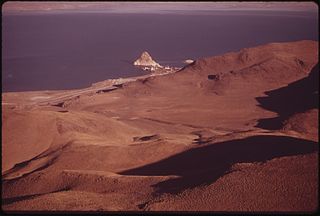
The Pyramid Lake Indian Reservation is a United States reservation in northwestern Nevada, approximately 35 miles (56 km) northeast of Reno, in Washoe, Storey, and Lyon counties.
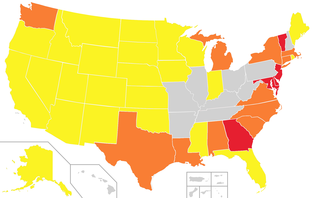
In the United States, state-recognized tribes are Native American Indian tribes, Nations, or Heritage Groups that do not meet the criteria for Federally recognized Indian tribes, but have been recognized by a process established under assorted state government laws for varying purposes. They may or may not be continually-existing tribal entities, and State recognition does not dictate whether or not they are recognized as Tribal Nations by continually-existing Tribal Nations.

The Grand Traverse Band of Ottawa and Chippewa Indians is a federally recognized Native American tribe located in northwest Michigan on the Leelanau Peninsula. Sam McClellan is the current tribal chairman, elected in June 2016 to a four-year term after succeeding Al Pedwaydon, who served from 2012 to 2016.

The Coushatta are a Muskogean-speaking Native American people now living primarily in the U.S. states of Louisiana, Oklahoma, and Texas.

The Mississippi Band of Choctaw Indians is one of three federally recognized tribes of Choctaw Native Americans, and the only one in the state of Mississippi. On April 20, 1945, this band organized under the Indian Reorganization Act of 1934. Also in 1945 the Choctaw Indian Reservation was created in Mississippi by the federal government by acquisition of lands in Neshoba, Leake, Newton, Scott, Jones, Attala, Kemper, and Winston counties. Other federally recognized tribes are the Choctaw Nation of Oklahoma, the largest, and the Jena Band of Choctaw Indians, a small group located in Louisiana.

The Nottawaseppi Huron Band of Potawatomi (NHBP) is a federally-recognized tribe of Potawatomi in the United States. The tribe achieved federal recognition on December 19, 1995, and currently has approximately 127 members.

The St. Croix Chippewa Indians of Wisconsin are a Federally recognized Indian Tribe, located in northwestern Wisconsin, along the St. Croix River valley and watershed.

The Muscogee (Creek) Nation is a federally recognized Native American tribe based in the U.S. state of Oklahoma. The nation descends from the historic Creek Confederacy, a large group of indigenous peoples of the Southeastern Woodlands. Official languages include Muscogee, Yuchi, Natchez, Alabama, and Koasati, with Muscogee retaining the largest number of speakers. They commonly refer to themselves as Este Mvskokvlke. Historically, they were often referred to by European Americans as one of the Five Civilized Tribes of the American Southeast.
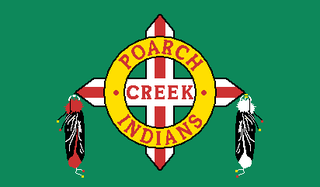
The Poarch Band of Creek Indians is the only federally recognized tribe of Native Americans in Alabama. Speaking the Muscogee language, they were formerly known as the Creek Nation East of the Mississippi.
The Paiute Indian Tribe of Utah is a federally recognized tribe of Southern Paiute and Ute Indians in southwestern Utah.

The Alabama–Coushatta Tribe of Texas is a federally recognized tribe of Alabama and Koasati in Polk County, Texas. The tribe hosts an annual powwow in early June. These peoples are descended from members of the historic Muscogee or Creek Confederacy of numerous tribes in the southeast United States, particularly Georgia and Alabama.
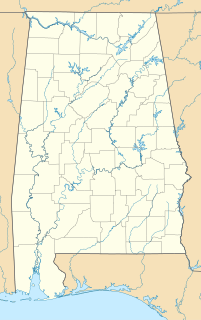
Hickory Ground, also known as Otciapofa is an historic Upper Muscogee Creek tribal town and an archaeological site in Elmore County, Alabama near Wetumpka. It is known as Oce Vpofa in the Muscogee language; the name derives from oche-ub,"hickory" and po-fau, "among". It is best known for serving as the last capital of the National Council of the Creek Nation, prior to the tribe being moved to the Indian Territory in the 1830s. It was added to the National Register of Historic Places on March 10, 1980.
References
- ↑ History of the Poarch Band of Creek Indians Archived 2010-07-27 at the Wayback Machine ," accessed 7 May 2007.
- ↑ U.S. Department of Commerce, Economic Development Administration, "Alabama: Poarch Creek Reservation", accessed 7 May 2007
- ↑ Paredes, J. Anthony. "Federal Recognition and the Poarch Creek Indians" in Peredes, J. Anthony, ed. Indians of the Southeastern United States in the Late 20th Century (Tuscaloosa: The University of Alabama Press, 1992) p. 121
- ↑ U.S. Department of Commerce, Economic Development Administration, "Alabama: Poarch Creek Reservation", accessed 7 May 2007
- ↑ "U.S. Decennial Census". Census.gov. Retrieved June 6, 2013.




